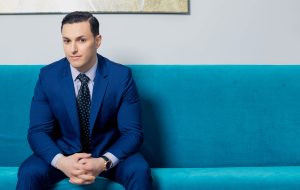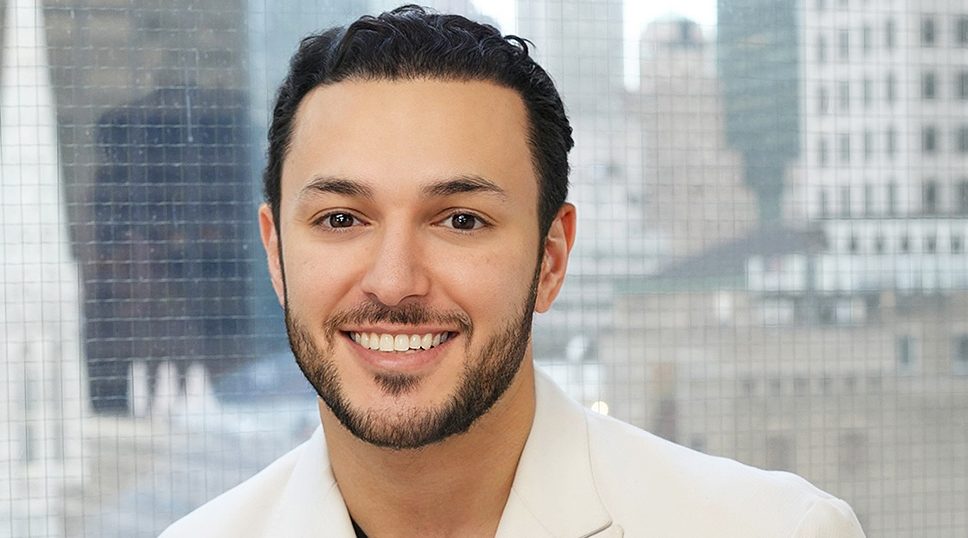Dr. Ammar Mahmoud, a highly respected cosmetic gynecological surgeon and aesthetic specialist in New York City, is known for his commitment to minimally invasive and regenerative approaches in women’s health.
With a background in biomedical engineering and a medical degree from St. George’s University—where he served as Vice President of the Medical Honor Society—Dr. Mahmoud has built a career dedicated to enhancing both the physical and emotional well-being of his patients. Dr. Mahmoud had previously served as a clinical associate professor at SUNY Downstate, where he was committed to mentor the next generation of medical professionals. At his practice, Alinea Medical Spa, Dr. Mahmoud specializes in labiaplasty, vaginal rejuvenation, PRP therapy, and other transformative procedures, all designed to prioritize patient comfort and quality of life. Known for his compassionate and patient-centered approach, Dr. Mahmoud has established a reputation for advancing cosmetic gynecology with integrity, innovation, and empathy.
What inspired you to pursue a career in cosmetic gynecology?
From a young age, I was fascinated by both science and wellness, and I initially pursued biomedical engineering because of its intersection with healthcare innovation. But as I went further in my studies, I realized that I wanted a more direct connection with people and a career where I could truly impact lives on a personal level. Cosmetic gynecology appealed to me because it offered a unique way to support women’s physical and emotional well-being.
I saw how impactful these procedures could be—not just in terms of aesthetics but also in the way they could restore function, comfort, and confidence. For many patients, these are life-changing outcomes, and being able to provide them is incredibly rewarding. This field has allowed me to blend my technical background with my passion for patient-centered care.
What does patient-centered care mean to you, and how do you implement it in your practice?
Patient-centered care, to me, is about understanding each patient as a whole person, not just a set of symptoms or concerns. It’s about building trust and actively listening to each patient’s wants and needs. Cosmetic gynecology, in particular, requires a lot of sensitivity, as patients often have deeply personal reasons for seeking these procedures. My goal is to ensure they feel comfortable and empowered throughout their journey.
In my practice, this means spending ample time in consultations, explaining all possible options, and making sure that each patient feels fully informed and supported. I also prioritize comfort and privacy, designing a welcoming environment where patients can express their concerns without fear of judgment. This holistic approach helps me address not just the physical but also the emotional aspects of care, which are equally important in these types of treatments.

How has your background in biomedical engineering influenced your approach to cosmetic gynecology?
My engineering background has given me a unique perspective on problem-solving and innovation. In biomedical engineering, we’re taught to look at the body as a complex system and to understand the mechanics and structure behind it. This knowledge has been invaluable when working on minimally invasive procedures that require a deep understanding of anatomy, tissue function, and healing processes.
I consistently evaluate new technologies and techniques with a critical eye, assessing not only their performance but also how they align with the body’s natural processes. Whether it’s laser treatments, PRP, or other regenerative therapies, I strive to offer solutions that are both technically advanced and safe, with a focus on achieving results that feel natural and enhance the body’s own healing abilities.
What advancements in regenerative medicine excite you most in the field of cosmetic gynecology?
The potential of regenerative medicine to transform patient care is incredible, particularly with treatments like PRP (platelet-rich plasma) therapy. PRP uses the body’s own growth factors to encourage collagen production, improve elasticity, and even support tissue healing. For patients who are looking for natural, minimally invasive options, PRP is a remarkable tool because it harnesses the body’s own biology to achieve rejuvenation.
I’m also excited about developments in stem cell therapy, though it’s still in its early stages in gynecology. The ability to use our own cells to regenerate tissue and enhance wellness is promising. Regenerative medicine aligns well with my philosophy of care, which is focused on helping patients achieve their goals without necessarily resorting to invasive measures unless necessary.
How do you stay up-to-date with the latest trends and technologies in your field?
Medicine is constantly evolving, so staying current is critical. I attend conferences and seminars, particularly those that focus on cosmetic gynecology and regenerative medicine. I also keep close ties with my colleagues and mentors, discussing new research findings and techniques to get a well-rounded view of each advancement.
Additionally, I’m part of several professional organizations, like the American Society of Cosmetic Surgeons and the International Society of Cosmetogynecology, which are excellent resources for industry updates. Being an educator also helps me stay on top of new developments. Preparing for lectures and training sessions with residents and students forces me to remain current and continually evaluate my approach to patient care.
What’s a common misconception about cosmetic gynecology that you’d like to address?
One misconception is that cosmetic gynecology is solely about aesthetics or vanity. While these procedures can certainly enhance appearance, they often address functional issues that significantly impact quality of life. Many of my patients come in with discomfort during exercise, intimacy, or even while wearing certain clothing. Procedures like labiaplasty or vaginal rejuvenation can alleviate these issues, restoring comfort and confidence.
I also think it’s essential to stress that these treatments are highly personal and should be about empowering the patient. Each person has their own reasons for seeking cosmetic gynecology, and those reasons are valid. The goal is to provide solutions that respect and align with their unique needs and goals.
What advice would you give to someone considering a cosmetic gynecology procedure?
First and foremost, choose a provider who makes you feel comfortable and understood. This field requires a deep level of trust, so it’s essential to find someone who listens to your goals without imposing their own agenda. Also, ensure that your provider is well-qualified, has a background in gynecology, and has experience in aesthetic procedures.
It’s also important to have realistic expectations. These procedures can be transformative, but like any medical treatment, they have limitations. A good consultation will clarify what’s achievable, so make sure to discuss your expectations openly. Finally, prioritize your comfort—if you don’t feel 100% confident, don’t proceed until you’re sure.
How do you bring your ideas to life in your practice?
I approach each new idea by looking at its practical application and patient benefit. I start by researching the science behind it, then consult with colleagues who may have already implemented similar approaches. Once I feel confident, I pilot the idea on a small scale with patients who are informed about the innovation and are open to new approaches. Their feedback is invaluable in refining the process.
I also rely on my team’s input; they’re integral to every step of implementation. From the patient coordinators to the nursing staff, each person plays a role in making new ideas successful. Innovation in my practice is a team effort, and I’m grateful to have such a committed group.
What is one habit that helps you remain productive?
Regular exercise is my go-to for maintaining productivity. Starting my day with physical activity keeps me energized and mentally focused, setting a positive tone for the rest of the day. It’s also my way of practicing what I preach to patients: prioritizing wellness and self-care. This habit has been instrumental in helping me manage the demands of my practice.
What is a challenging experience you’ve had in your career, and how did you overcome it?
One of my earliest challenges was handling a patient outcome that didn’t meet their expectations. It was a humbling experience, and I realized that even with the best intentions, sometimes results fall short. I overcame it by taking full accountability and working with the patient to make things right. It taught me the importance of clear communication and setting realistic expectations from the start. I now take extra care to ensure that every patient understands the procedure fully, including potential outcomes and limitations.
What do you do when you feel overwhelmed or unfocused?
When I’m feeling overwhelmed, I try to take a step back. I’ll go for a short walk, do some breathing exercises, or listen to music to reset. This brief pause helps me regain focus and allows me to approach my tasks with a fresh perspective. I also try to keep a clear schedule and set boundaries, which helps me avoid burnout and stay grounded.
Is there a piece of technology or software that has been essential to your practice?
We use a secure patient management system that has made our scheduling, documentation, and follow-up processes much more efficient. This software allows me to spend more time focusing on patients and less time on administrative tasks. Having everything organized in one place helps my team and I provide a seamless experience from consultation to post-procedure care.
What book has made a significant impact on you, and why?
One book that’s had a profound impact on me is “The Power of Habit” by Charles Duhigg. It delves into the science behind habit formation and how small, consistent changes can lead to major transformations. The insights from this book have helped me develop better routines in both my personal and professional life, and it’s been especially helpful in understanding how to support my patients in making lifestyle changes for their health.
Do you have any personal philosophies that guide your work?
I believe in the power of empathy and that every patient should leave feeling that they’ve been truly heard and respected. I approach each case with the mindset that this could be someone in my own family, and I want them to feel valued and supported. This philosophy has been the backbone of my practice, and it’s something I hope to pass on to every patient and every member of my team. Empathy isn’t just a trait; it’s an essential part of effective medical care. It allows us to connect with patients on a human level, which I believe leads to better outcomes, greater trust, and a more positive overall experience.
I also believe in honesty and transparency. Patients deserve to know exactly what to expect, the benefits and limitations of each procedure, and to feel empowered to make their own decisions. My role is to guide and inform, not to push any particular path. This commitment to transparency helps build strong, trusting relationships, which are foundational in a field as intimate as cosmetic gynecology.
Finally, continuous improvement is a core value for me. Medicine is always evolving, and I believe that as a provider, it’s my responsibility to keep learning, adapting, and striving to offer the highest standard of care. Whether it’s staying updated on the latest techniques, investing in new technologies, or seeking feedback from patients, I’m always looking for ways to improve. This philosophy of empathy, honesty, and growth guides everything I do in my practice and is at the heart of my approach to patient care.

